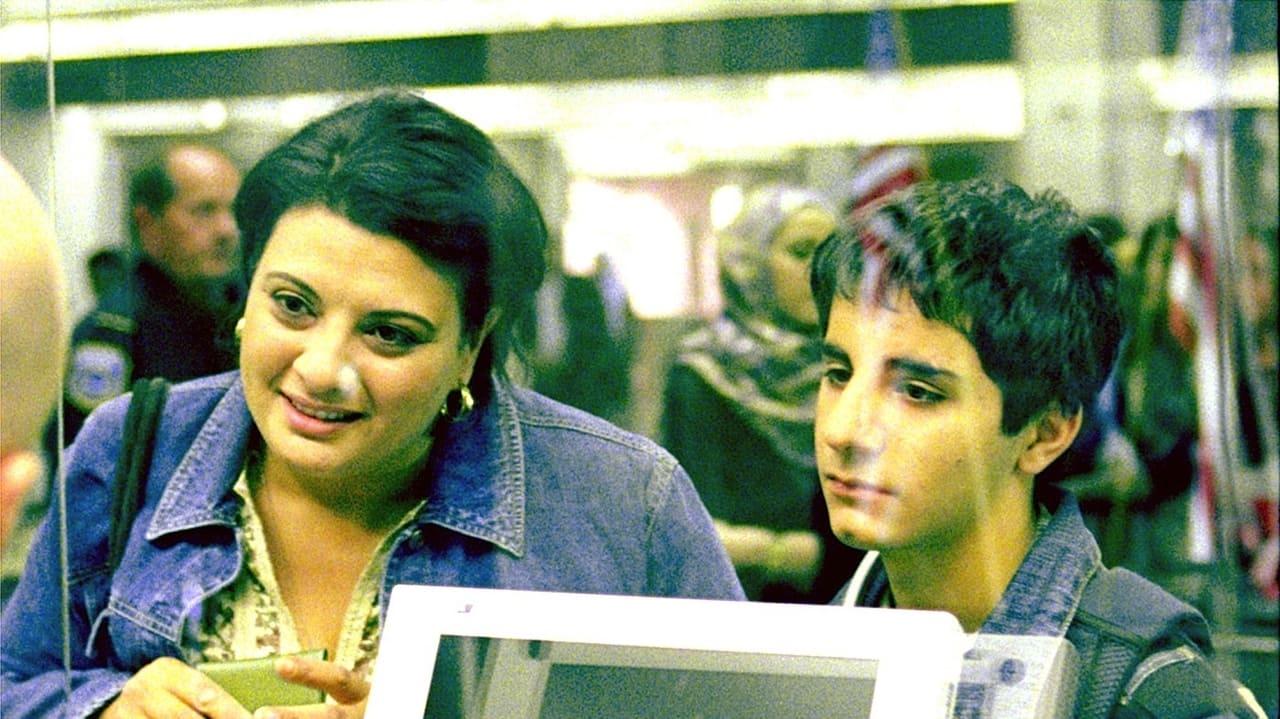punishmentpark
Lucky me, seeing Alia Shawkat twice in a row, unexpectedly, on a Saturday film night. This time she plays an American cousin to a Palestinian boy who comes to America with his mother. It starts out in Palestine (West Bank) though, and it's really interesting to get a sense of that place through a piece of film drama (other than the news or a documentary).Main character Muna Farah is played very well by Nisreen Faour, as her struggles with her new life really come across. Director Cherien Dabis said it like this, elsewhere on the net: 'had a sweetness about her [...] a kindness and a childlike sense of wonder. There was something about her that was so youthful, and yet, I could still see in her eyes the depth of sadness that her life experience had given her.' That's what I was trying to say!The story is more like a series of incidents, the main lines being Muna trying to find work and her son Fadi trying to regain his identity (though there is plenty beyond that, like how the family they stay with is coping). There is the school principal who befriends Muna, and there is the hostile schoolboy who opposes Fadi - and from there on it goes... and quite suddenly ends - leaving me to think this would have made great material for at least a miniseries.On the whole it's a very sympathetic little film - low key and low budget - truly with its heart in the right place.
U.N. Owen
In the heartfelt indy film, AMREEKA, one of the truly standout acting finds, is the beautifully performed role of Muna, played by Nisreen Faour - a divorced Palestinian woman, with a teenage son, Fadi (played by Melkar Muallem), who decides to leave their home country, and travel to America (actually, it was filmed in Canada).Muna has several degrees, but, due them not being accepted, she must work at a White Castle.Her son's quiet, and, as is often the case - but worse - is picked on, as the 'new kid,' but, being Arab, at this time, the whole conflict between westerners and the Arab countries comes into play - with Fadi being use as the totem, for the 'terrorist' as well as the 'cause' another classmate's brother (a soldier) went into the military. All through this hard, and difficult time of transition, Muna has an optimism, and chutzpa, and, a warmth, that had me wishing she was my mom.I wasn't planning to watch AMREEKA, but, after seeing the first few minutes, I became so engrossed in this determined woman to MAKE things work out for her, and her son, I watched it through. And, am happy I did.You will be too.
johnstonjames
I can see from some of the reviews that some people didn't like this heart warming little film. that seems awfully hard. what's not to like? sure it's simplistic, but so many things about the heart and feelings are. besides, it's very straight forward and makes some very good points.the film benefits greatly from a excellent and touching performance by actress Nisreem Faour as the main protagonist Muna, who immigrates from Palestine to Illinois here in Amreeka. the performance is based all on heart and the feeling functions rather than anything cerebral which is why it is so moving and special when so many actors over think their roles to the point of rigid contrivance. Faour's performance just flows naturally,smoothly,and believably without any hint of falseness.politically there is nothing controversial about this film really. unless maybe you're Zionist extremist or someone with a psycho racist agenda. i think people on both sides are getting a little tired of the West Bank being occupied to such an extent and of having the Palestinian people vilified all the time. this soft peddling little film might just be the ticket to get people to lighten up. if they can lighten up enough to watch it.
Chad Shiira
Contrary to popular belief among the narrow-minded, not all Arabs are Muslims. Case and point: only one of the two female office workers, employees at a Palestinian bank, have their heads covered, in the opening scene of "Ameerka", a relevant film about the emigrants that makes some of us leery, still, eight years and counting after that fateful day in September. Even if Muna(Nisreem Faour) was a Muslim, and did wear a headscarf in compliance with Islamic law, would it make this divorced mother of one any less likable? Of course not. Not all Muslims are terrorists, contrary to popular belief. By default, "Ameerka" is a political movie, but it doesn't have to be one; it's the people that Muna and her son Fadi(Melkar Maleem) meet stateside, who make their presence a political matter. Despite having no outlying signifiers to correspond with their ethnicity, as if being Arab itself is supposed to denote one's religious affiliation in the first place, people prefigure their disposition, and treat them accordingly, with suspicion, with disregard.At the outset of "Ameerka", the small Palestinian family is made instantly relatable in a sequence that establishes how close-knit Mni and Fadi are, which completely transcends their "otherness". When the mother asks her son about his homework, having just picked the boy up from his private school, they could be American, but this parental concern is transformed by context and becomes a Palestinian scene, as their intimacy is interrupted by the car's arrival at a checkpoint, ending any semblance of normality, in which the Israeli soldier goes about his vehicle inspection. Once home, a house they share with the family matriarch, Muna quietly asks Fadi to get the tomatoes from the car, reining her temper in while Fadi's grandmother complains about her daughter's forgetfulness. Those tomatoes came from the produce market, a hole in the wall where Muna, recently divorced, had encountered her ex-husband's new wife, who is both younger and skinnier, and arguably, prettier, than her. When Muna boards the plane to America with her son, she's carrying around a broken heart, not a bomb.The Farahs go to Illinois. That's where Muna's sister Raghda(Hiam Abbass) and her family lives. It's also where Fadi got accepted to an expensive school. Blissfully unaware of her own Americanization, Raghda possesses an American's arrogance, talking about Palestine as if she still knew her. Muna knows. She knows it's better to be a foreigner than a prisoner. Muna corrects her older sister, who feels Palestinian because she shops at a Palestinian grocers, and can speak in her own native language without the cold stares of American housewives that greeted them at the supermarket. With enough English to get by, Muna goes job-hunting, and ends up serving burgers at White Castle, a last resort to unemployment, after being turned away by a host of prejudicial bank managers. The job embarrasses Muna, but she's a go-getter, so there's definitely a place for her in this country. When Muna's principal, a Polish-Jew(remember: Muna is Palestinian), drives her back to work(after being called in for a conference over Fadi's fisticuffs with his tormentor), he stays for lunch, after returning the handbag she left behind in his car. As he eats the famous White Castle fare, she mops, but then he invites her to sit with him(remember: the principal is Jewish), because she's entitled to be there, like she and Fadi are entitled to be in America. Muna has the right to dream of a better life. Living paycheck to paycheck is not good enough for her. She sells a weight-loss drink, and later in "Ameerka", she slips on the liquid, the handiwork of Fadi's tormentor, who knocks an open can off the White Castle counter. Flat on her back, that's where Muna might end up in this country, but she has a right to fail, and she has a right to get up, and try again.


 AD
AD




